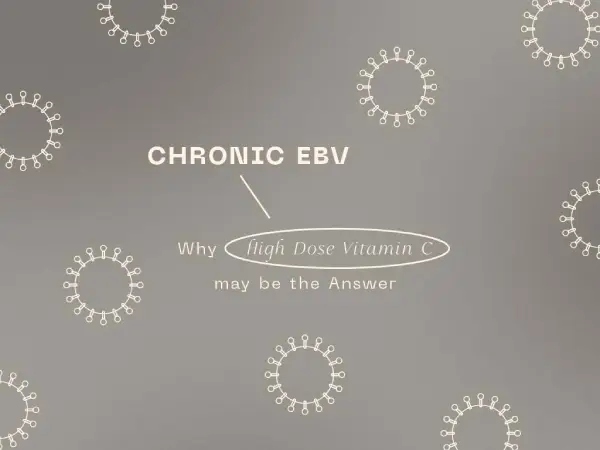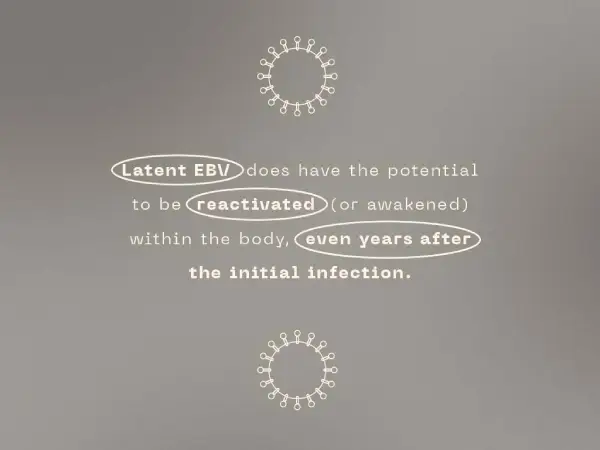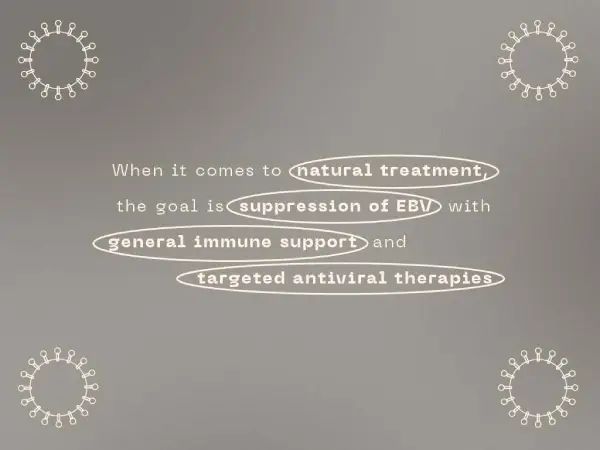Blog
Chronic EBV & Why High Dose Vitamin C May be the Answer

EBV – a common and lifelong infection
EBV stands for Epstein-Barr virus, a virus also known as herpesvirus 4, which as its name implies comes from the family of herpesviruses. This virus is one of the most common human viruses worldwide and infection affects more than 90% of people within their lifetime – surprising, right? And that’s not all, once infected with EBV it lives inside human B cells (a type of immune cell) forever. So, how do so many people become infected with EBV? EBV is spread from person to person through bodily fluids, primarily saliva, but also from blood, sexual fluids, and organ transplants. This means people can become easily infected by sharing food, drinks, and other personal items with infected people. Only people with active infection (either at initial infection or reactivation) can spread the virus. During the initial infection of EBV, the virus is active within the body; typically, children do not experience any symptoms, whereas teenagers and adults may develop infectious mononucleosis (AKA mono, often referred to as the “kissing disease” and now you know why). Mono is an illness characterized by the triad of:
- Fever
- Sore throat
- Swollen lymph nodes (mostly in the neck)
Other common symptoms of EBV infection include:
- Fatigue
- Head and body aches
- Congestion
- Rash
- Swollen liver and/or spleen
- Liver dysfunction
- Low platelet levels
People usually recover from mono within 2 to 4 weeks; however, fatigue can persist for several more weeks to months. After the initial infection, whether symptomatic or not, the virus remains in the body but becomes dormant (in a sort of sleeping state). This is called latent infection in which the virus is inactive and does not spread or cause any symptoms.
Latent EBV does have the potential to be reactivated (or awakened) within the body, even years after the initial infection. Reactivation can be caused by a number of different factors that ultimately lead to weakening of the immune system, such as chronic stress, nutritional deficiencies, environmental toxicities, hormonal imbalances, co-infections, or immunosuppressive medications. Most healthy people will become infected with EBV but won’t have to deal with consequences of it either at all or ever again after mono has run its course. However, EBV does have possible complications from reactivation or persistently activated EBV. These possible complications include:
- Rupture of the spleen
- Anemia
- Disorders of the heart, liver, and nervous system
- Chronic fatigue syndrome
- Rare cancers (including Hodgkin lymphoma, Burkitt lymphoma, nasopharyngeal carcinoma, gastric carcinoma)
- Autoimmune diseases (including Hashimoto’s thyroiditis, Grave’s disease, multiple sclerosis, rheumatoid arthritis, type I diabetes, celiac disease, inflammatory bowel disease, lupus)
Malignancy and other EBV-related disorders are more likely to occur in people with weakened immune systems. In most people, lifelong EBV infection is benign and well-controlled by a strong immune system. Certain people might develop a rare and serious disorder known as chronic active EBV (CAEBV), which causes ongoing symptoms and confirmation of active infection on blood testing.
Diagnosis & Treatment of EBV – the need for natural suppression of EBV
Diagnosis of EBV will need to be done with a doctor who will assess numerous parameters of your health to determine your EBV status. EBV is most commonly confirmed with a blood test that detects antibodies associated with EBV infection:
- Viral capsid antigen (VCA) IgM: if detected indicates active infection
- Viral capsid antigen (VCA) IgG: if detected indicates active or past infection
- Epstein-Barr nuclear antigen (EBNA) antibodies: if detected indicates past infection
- Epstein-Barr early antigen (EA) antibodies: if detected indicates active infection
Did you know that about 9 out of 10 adults have antibodies that show they have a current or past EBV infection? If you’re interested in getting tested, this can be done with one of our naturopathic doctors (ND) at LIVV.
There is no specific cure or preventative vaccine available for EBV infection. Prevention involves avoiding all contact with infected individuals and their belongings, as well as maintaining good hygiene. Conventional treatment focuses on relieving symptoms with hydration, rest, and fever-reduction. There are multiple antiviral medications shown to inhibit EBV replication in test-tube experiments, however, none are approved for the treatment of EBV infection and evidence of clinical benefit is limited. One therapy, called adoptive transfer of EBV-specific cytotoxic T lymphocytes (a process of using donor-derived T cells, a type of immune cell, that help combat EBV) is emerging as a hopeful approach against EBV. As far as complications, treatment will be specific to each malignancy or other EBV-related disorder.
When it comes to natural treatment, the goal is suppression of EBV with general immune support and targeted antiviral therapies. There is no official therapy for eradicating the virus completely, however, there are therapies that can keep the virus in, or return it to, its dormant state. Treatment may involve diet and lifestyle modification, supplementation of herbs and/or nutrients, and therapies such as IV therapy, hydrotherapy, or ozone therapy. Preliminary data is favorable for vitamin C, curcumin, and reishi mushroom extract for the treatment of chronic EBV. A nutritious diet containing sufficient amounts of vitamin A, C, and D is important in the control of EBV infection and prevention of disease. There are many more supportive therapeutics available – talk to your ND at LIVV about your options!
One therapy in particular – high dose IV vitamin C (IVC) – is a very effective method of supporting immune function, addressing nutrient deficiency, and fighting viral infections – talk about getting the most bang for your buck! Let’s learn more about this therapy and how it may benefit those with EBV infection.
High Dose IVC – a promising therapy for acute and chronic EBV
Vitamin C (AKA ascorbic acid) is one of the vitamins our body requires in certain amounts for normal and optimal functioning. It plays many important roles in the body especially for immune and connective tissue health. Vitamin C is used extensively for preventing and treating a wide range of health conditions. As you’ve probably heard, it is a very powerful antioxidant – antioxidants are molecules that help decrease inflammation and oxidative stress in the body. Interestingly, the -oxidant activity of vitamin C changes at different dosages; it acts as an anti-oxidant at less than 25 grams and as a pro-oxidant at 25 grams and over. Generally, anything that promotes inflammation is avoided in order to promote health – but in this case, increasing the inflammatory load in the body is therapeutic because it helps to destroy pathogens (disease causing microorganisms) – how cool is that!
A typical dose of vitamin C when supplemented orally is anywhere from 0.5-2 grams per day, in divided doses for best absorption. A high dose of vitamin C via IV can be defined as 10 grams or more (sometimes up to 50 grams and over). High doses of vitamin C in the blood may exert antiviral, antibacterial, antihistamine, and antitumor effects. Therefore, high dose vitamin C is often used to treat chronic infections (both viral and bacterial). High doses of vitamin C are administered through IV therapy because bypassing the digestive system raises the amount of vitamin C in the body much higher than possible by oral intake. According to a research study presented in the Natural Medicine Journal, IVC in ranges from 7.5 to 50 grams suggests a positive effect on length of disease and reduction of viral antibody levels. Another study from the BMJ journal stated that higher blood levels of vitamin C have been correlated with lower levels of viral antibody levels (VCA IgM and EA IgG) in patients with acute and prolonged symptomatic EBV infection. These results suggest that high dose intravenous vitamin C (IVC) may be significantly beneficial for improving symptoms of acute and chronic EBV.
It is crucial to note that high dose IVC may lead to hemolysis (destruction of red blood cells) and acute kidney failure in people with a genetic condition known as glucose-6-phosphate dehydrogenase (G6PD) deficiency. G6PD is an enzyme required for an important biochemical pathway in the body that produces a cofactor needed to protect red blood cells against the pro-oxidant effects of high dose vitamin C. Thus, this therapy is contraindicated for anyone with a G6PD deficiency and all individuals must be tested for this deficiency before being treated with any dose of IVC above 20 grams. LIVV is proud to offer this miraculous IVC therapy – bloodwork and consultation with one of our NDs (or a referral from another doctor) is required. Your ND at LIVV will explain all aspects of the procedure – such as indications, safety, preparation, contraindications, side effects, etc. – and can work with you one-on-one to create a personalized plan for treating and managing your EBV infection – call today to schedule your appointment!
Written by Jordan Valdez, RDN
References
Research Articles:
Mikirova N, Hunninghake R. Effect of high dose vitamin C on Epstein-Barr viral infection. Med Sci Monit. 2014;20:725-732. Published 2014 May 3. doi:10.12659/MSM.890423
Kerr JR. Epstein-Barr virus (EBV) reactivation and therapeutic inhibitors. Journal of Clinical Pathology. 2019;72:651-658.
Websites:
https://www.dynamed.com/condition/epstein-barr-virus-ebv-infection
https://thyroidpharmacist.com/articles/epstein-barr-virus-and-hashimotos/
https://fullyfunctional.com/2018/02/28/reactivated-epstein-barr-virus-need-know/
https://centrespringmd.com/is-epstein-barr-virus-reactivation-the-underlying-cause-of-your-fatigue/
https://www.healthline.com/health/epstein-barr-virus#complications


